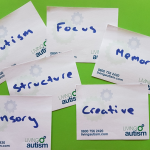‘How can I support an autistic colleague or employee?’ is a question which is often asked in the workplace. With the prevalence of autism standing at around 1.5% of the population, many workplaces will be employing people on the autism spectrum whether they have declared it or not.
I write this article as a neurotypical coach who has been supporting autistic people in the workplace as well as coaching their managers for the past decade.
There is no obligation on anyone with a diagnosis of autism to declare their diagnosis to their employer. However, if reasonable adjustments are required, then the diagnosis needs to be declared. With or without a diagnosis and with or without a declaration some managers and colleagues will observe behaviours – both qualities and challenges – which they might relate to an autism spectrum condition.
Without disclosure how can you support an autistic colleague or employee?
Therefore, the key to providing support is to address the behaviour, to support the individual in establishing what drives the behaviour and then together to establish strategies which will enable the strengths to come to the fore and will reduce the challenges. You can lead with “I noticed that …” and then you might ask “Is there something I can do to help?”
Some autistic people will be aware they are having difficulties; however, will not know how or why they are having these difficulties. In a coaching or mentoring role, as a colleague or as a manager, you can support them in exploring how some of their behaviours are impacting on others and you can help them to understand why that is.
Another key point to remember is that every autistic person is an individual and they will not fit within a stereotypical view of autism. Autistic people can be exceptional employees in all sorts of industries – technology, sciences, law, language, sociology, psychology, the arts and many, many more. They will bring swathes of strengths and qualities and they will be experiencing a wide range of challenges.
Asking some initial questions in an informal setting will provide important information in how you might be able to support your autistic colleague or employee.

Questions to ask
The following questions can be asked in both informal and formal settings and can be asked in one sitting or over a period of time. Remember that you must not anticipate the answers. The answers will be as varied as for neurotypical people. Also remember that some autistic people need time to process information or to process questions before answering. Therefore, do not feel tempted to immediately fill a short silence. The questions you can consider asking are –
- Do you have any special interests and, if so, what are they?
- What strengths do you display through your special interests?
- What other strengths are you aware of?
- What thing distresses you most?
- What situations do you find most challenging?
- What physical environment do you find most challenging?
- Which strategies help you when you are anxious?
The answers you receive to the above questions will provide you with some insight into why you are observing certain behaviours and will also provide you with some ideas as to reasonable adjustments that might help your autistic employee or colleague.
There are some strengths and challenges which are more prevalent in the general autistic population and these are offered below as a loose guide.

Strengths and qualities
Some strengths and qualities you might observe are –
- excellent memory
- precision and attention to detail
- focus
- creativity
- a preference for following instructions and abiding by rules
- working on structured programmes
- being direct, open and honest
- copying and reproducing behavior (masking)
- dealing with projects which have a clear beginning, middle and end
- offering different perspectives
- strong sense of fairness and justice
Strengths and qualities should be encouraged and promoted in the workplace. Praise and encouragement can be motivating and empowering. Some people on the autism spectrum find it hard to know what someone else is thinking. Therefore, praise needs to be clearly articulated.
Challenges
You might observe your colleague or employee displaying difficulties in –
- picking up on unwritten social rules
- engaging in small talk
- taking things literally and misunderstanding jokes and sarcasm
- imagining what someone else is thinking
- understanding the complexities of inter-personal relationships
- becoming obsessed with a person, place or interest
- managing unexpected change
- remembering things in sequence
- making decisions
- making plans
- experiencing either hyper- or hypo- sensitivity (differences in the way they experience sensory input, either too much or too little)
Finding strategies and tools which can help to reduce the challenges means the strengths and qualities can be used more effectively in the workplace.

Strategies and tools
Strategies and tools to support an autistic employee or colleague will be specific to each individual; however, some strategies for support which are helpful to autistic employees and would also benefit the other employees in an organisation are –
- clear and unambiguous communication, eg “you will find it next door” – does this mean the room next door, the building next door or another next door?
- agendas prior to meetings
- diaries, schedules and reminders
- clear rules, policies and procedures followed by all
- prior notice of change where possible
- a calm environment where possible – lower lighting, reduced sound, fewer people
- provision of a quiet space to which a person can retreat
It is important to talk to your autistic colleague or employee to find out what would most help them. Asking the questions at the beginning of this article will give you a good start to build upon.
Coaching and training
In my experience the most successful interactions and working relationships are established when the autistic person is coached in understanding what the expectations of neurotypical people are and, alongside this, when the neurotypical people around them understand what autistic people expect.
Awareness, understanding and acceptance is a two-way street. It takes effort from both sides. It is not sufficient for an autistic person to receive coaching if the people they work with have no understanding of how they are experiencing the world. Equally, it is not enough for managers and teams to be trained in autism awareness if the autistic person does not understand the behaviour or expectations of neurotypical people.
Diversity brings a colorful richness to the workplace which benefits individuals, teams and organizations. An understanding of differences can lead to an acceptance of how different strengths can be brought together to complement each other and to form a balanced, resilient environment. Understanding people’s challenges can mean that support is directed in the most efficient and appropriate ways. This in turn benefits mental health and wellbeing in the workforce.
Editor’s note
Our readers might also be interested in the article from NCC Home Learning in the link below – A Guide to Autism Awareness in the Workplace
______________________________________________________________



